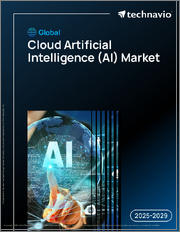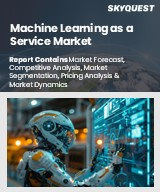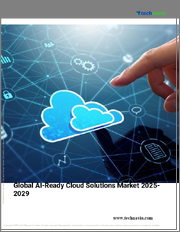
|
시장보고서
상품코드
1700096
클라우드 AI 시장 : 구성 요소별, 배포 모드별, 조직 규모별, 기술별, 최종 사용자별, 지역별 분석 및 예측(-2032년)Cloud AI Market Forecasts to 2032 - Global Analysis by Component (Hardware, Software and Services), Deployment Mode (Public Cloud, Private Cloud and Hybrid Cloud), Organization Size, Technology, End User and By Geography |
||||||
Stratistics MRC에 따르면 세계의 클라우드 AI 시장은 2025년에 1,021억 달러를 차지하고, 예측 기간 동안 CAGR은 30.5%를 나타내 2032년에는 6,586억 달러에 이를 것으로 예측됩니다.
클라우드 AI는 클라우드 컴퓨팅 환경 내에서 인공지능(AI) 기능을 통합하는 것을 의미합니다. 이를 통해 기업 및 개발자는 온프레미스 인프라 없이 머신러닝, 자연 언어 처리, 컴퓨터 비전 등의 AI 기반 서비스에 액세스할 수 있습니다. AI와 같은 공급업체가 제공하는 클라우드 AI 플랫폼은 확장 가능한 컴퓨팅 능력, 사전 학습된 모델 및 AI 구축을 가속화하는 API를 제공함으로써 기업은 대규모 데이터 세트를 처리하고, 자동화를 강화하고, AI 주도의 용도를 효율적으로 배포할 수 있습니다.
IBM에 따르면 98%의 조직이 멀티클라우드 아키텍처를 채택할 계획이며, 멀티클라우드 관리 전략을 수립하는 것은 41%, 이러한 환경에서 운영하는 데 필요한 절차와 도구를 제공하는 것은 38%에 그쳤다고 합니다.
AI 서비스에 대한 수요 증가
AI 서비스에 대한 수요가 높아짐에 따라 클라우드 AI 시장을 뒷받침하고 있으며, 기업은 효율성, 확장성, 의사결정을 개선할 수 있습니다. AI 구동형 용도의 혁신은 의료, 금융, 소매 등 업계에서 이 채용 붐에 의해 뒷받침되고 있습니다.
인프라 과제
인프라 과제는 확장성 제한, 지연 증가, 운영 비용 상승으로 클라우드 AI 시장의 성장을 크게 저해합니다. 기존 시스템과 클라우드 플랫폼 간의 상호 운용성이 낮아 채택을 더욱 복잡하게 만들고 있습니다.
AI 기술의 진보
AI 기술의 진보는 자동화, 확장성, 효율성을 향상시켜 클라우드 AI 시장을 추진하고 있습니다. 실시간 데이터 분석, 예측 분석 및 지능형 자동화는 AI가 탑재된 클라우드 솔루션을 통해 가능하며 다양한 분야의 의사결정을 강화하고 있습니다. 클라우드의 성능과 신뢰성은 AI 중심의 보안, 머신러닝 및 자연 언어 처리의 발전으로 향상되었습니다. 이러한 개발을 통해 기업은 디지털 전환을 가속화함으로써 점점 더 데이터 주도형이 되고 있는 세계에서 혁신을 일으켜 경쟁 우위를 확보할 수 있습니다.
규정 및 규정 준수 문제
규제 및 규정 준수 문제는 엄격한 데이터 프라이버시 법, 보안 표준 및 국경을 넘어서는 데이터 전송 제한을 부과함으로써 클라우드 AI 시장을 방해합니다. GDPR(EU 개인정보보호규정) 및 CCPA와 같은 진화하는 규제에 대한 규정 준수는 운영 비용과 복잡성을 증가시킵니다. AI 거버넌스의 불확실성, 윤리적 우려, 법적 책임은 더욱 채용을 지연시킵니다. 헬스케어, 금융, 정부 부문에서 엄격한 업계 특유의 규칙이 장벽이 되어, 클라우드 AI 프로바이더의 혁신, 확장성, 세계적인 시장 확대가 제한됩니다.
COVID-19의 영향
COVID-19의 유행은 기업이 원격 근무, 자동화, 데이터 중심의 의사 결정을 가능하게 하는 디지털 변환을 받아들여 클라우드 AI 채택을 가속화했습니다. 헬스케어, 전자상거래, 사이버보안 분야에서는 AI를 활용한 혁신이 크게 진전되었습니다. 그러나 처음에는 공급망 혼란과 경제 불확실성이 투자를 둔화시켰습니다. 유행 이후 확장성, 효율성 및 고객 경험 향상에 대한 요구가 원동력이 되어 AI를 활용한 클라우드 솔루션에 대한 수요가 계속 증가하고 있습니다.
예측 기간 동안 제조 부문이 최대가 될 전망
클라우드 AI는 첨단 머신러닝 알고리즘을 통해 실시간 모니터링, 생산 공정 최적화 및 품질 관리 개선을 가능하게 하기 때문에 예측 기간 동안 제조 부문이 최대 시장 점유율을 차지할 것으로 예상됩니다. AI 기반 로봇 기술과 IoT 솔루션을 통합함으로써 제조업체는 비용 절감, 생산성 향상 및 공급망 관리의 간소화를 실현할 수 있습니다.
예측 기간 동안 소프트웨어 분야의 CAGR이 가장 높아질 전망
예측 기간 동안 소프트웨어 분야가 가장 높은 성장률을 보일 것으로 예상됩니다. AI가 추진하는 소프트웨어 솔루션이 디지털 변환을 가속화하면서 비용 효율성, 확장 성 및 효율성을 향상시키기 때문에 소프트웨어는 머신러닝 알고리즘, 자연 언어 처리 및 예측 분석 지속적인 개선으로 가상 어시스턴트, 사기 감지, 재단사 추천 등 클라우드 AI 용도의 혁신을 추진하고 있습니다.
최대 점유율을 차지하는 지역
예측 기간 동안 아시아태평양은 디지털 전환 증가, 클라우드 도입의 확대, AI 개발을 지원하는 정부의 이니셔티브로 최대 시장 점유율을 차지할 것으로 예상됩니다. 다양한 산업 분야의 기업들은 AI 기반 클라우드 솔루션을 활용하여 효율성을 높이고, 프로세스를 자동화하며, 혁신을 추진하고 있습니다. 스마트 시티, 핀테크의 진전, 헬스 케어 AI의 대두가 시장 확대를 한층 더 가속시키고 있습니다.
CAGR이 가장 높은 지역 :
예측 기간 동안 북미가 가장 높은 CAGR을 나타낼 것으로 예측됩니다. 이는 기업이 예측 분석, 개인화된 고객 경험, 업무 생산성 향상을 위해 AI를 활용한 클라우드 솔루션을 활용하기 위한 것입니다. 이와 함께 디지털 전환을 가속화합니다. 클라우드 AI는 확장성, 비용 절감, 데이터 주도의 통찰을 촉진하고, 헬스케어, 금융, 소매 등의 분야에 혜택을 가져옵니다.
무료 사용자 지정 오퍼링 :
이 보고서를 구독하는 고객은 다음 무료 맞춤설정 옵션 중 하나를 사용할 수 있습니다.
- 기업 프로파일
- 추가 시장 기업의 종합적 프로파일링(3개사까지)
- 주요 기업의 SWOT 분석(3개사까지)
- 지역 세분화
- 고객의 관심에 응한 주요국 시장 추계·예측·CAGR(주 : 타당성 확인에 따름)
- 경쟁 벤치마킹
- 제품 포트폴리오, 지리적 존재, 전략적 제휴에 기반한 주요 기업 벤치마킹
목차
제1장 주요 요약
제2장 서문
- 개요
- 이해관계자
- 조사 범위
- 조사 방법
- 데이터 마이닝
- 데이터 분석
- 데이터 검증
- 조사 접근
- 조사 자료
- 1차 조사 자료
- 2차 조사 정보원
- 전제조건
제3장 시장 동향 분석
- 성장 촉진요인
- 성장 억제요인
- 기회
- 위협
- 기술 분석
- 최종 사용자 분석
- 신흥 시장
- COVID-19의 영향
제4장 Porter's Five Forces 분석
- 공급기업의 협상력
- 구매자의 협상력
- 대체품의 위협
- 신규 참가업체의 위협
- 경쟁 기업간 경쟁 관계
제5장 세계의 클라우드 AI 시장 : 구성 요소별
- 하드웨어
- 소프트웨어
- 서비스
제6장 세계의 클라우드 AI 시장 : 배포 모드별
- 퍼블릭 클라우드
- 프라이빗 클라우드
- 하이브리드 클라우드
제7장 세계의 클라우드 AI 시장 : 조직 규모별
- 중소기업
- 대기업
제8장 세계의 클라우드 AI 시장 : 기술별
- 머신러닝(ML) 및 딥러닝
- 자연언어처리(NLP)
- 컴퓨터 비전
- 음성인식
- 기타 기술
제9장 세계의 클라우드 AI 시장 : 최종 사용자별
- 은행, 금융서비스 및 보험(BFSI)
- 헬스케어 및 생명과학
- 소매 및 E커머스
- IT 및 통신
- 제조
- 정부 및 방위
- 에너지 및 유틸리티
- 미디어 및 엔터테인먼트
- 자동차 및 운송
- 기타 최종 사용자
제10장 세계의 클라우드 AI 시장 : 지역별
- 북미
- 미국
- 캐나다
- 멕시코
- 유럽
- 독일
- 영국
- 이탈리아
- 프랑스
- 스페인
- 기타 유럽
- 아시아태평양
- 일본
- 중국
- 인도
- 호주
- 뉴질랜드
- 한국
- 기타 아시아태평양
- 남미
- 아르헨티나
- 브라질
- 칠레
- 기타 남미
- 중동 및 아프리카
- 사우디아라비아
- 아랍에미리트(UAE)
- 카타르
- 남아프리카
- 기타 중동 및 아프리카
제11장 주요 발전
- 계약, 파트너십, 협업, 합작투자
- 인수와 합병
- 신제품 발매
- 사업 확대
- 기타 주요 전략
제12장 기업 프로파일링
- Amazon Web Services(AWS)
- Microsoft
- IBM
- Oracle
- NVIDIA
- Salesforce
- SAP
- Alibaba Cloud
- Intel
- Hewlett Packard Enterprise(HPE)
- Tencent Cloud
- H2O.ai
- OpenAI
- Baidu
- DataRobot
- Huawei
- C3 AI
- Cloudera
According to Stratistics MRC, the Global Cloud AI Market is accounted for $102.1 billion in 2025 and is expected to reach $658.6 billion by 2032 growing at a CAGR of 30.5% during the forecast period. Cloud AI refers to the integration of artificial intelligence (AI) capabilities within cloud computing environments. It enables businesses and developers to access AI-powered services, such as machine learning, natural language processing, and computer vision, without the need for on-premises infrastructure. Cloud AI platforms, offered by providers like Google Cloud AI, AWS AI, and Microsoft Azure AI, offer scalable computing power, pre-trained models, and APIs to accelerate AI adoption. By leveraging the cloud, organizations can process large datasets, enhance automation, and deploy AI-driven applications efficiently. Cloud AI is widely used in industries like healthcare, finance, and retail for predictive analytics and intelligent automation.
According to IBM, while 98% of organizations plan to adopt multi-cloud architectures, only 41% have a multi-cloud management strategy and 38% have the necessary procedures and tools to operate in such an environment.
Market Dynamics:
Driver:
Rising Demand for AI Services
The growing demand for AI services is propelling the Cloud AI market, allowing businesses to improve efficiency, scalability, and decision-making. Cloud AI solutions give enterprises access to automated processes, real-time information, and affordable processing capacity. Innovation in AI-driven applications, such natural language processing and predictive analytics, is fueled by this adoption boom in industries like healthcare, finance, and retail. The market is expected to grow faster as businesses incorporate AI more and more into cloud platforms, promoting digital transformation on a worldwide scale.
Restraint:
Infrastructure Challenges
Infrastructure challenges significantly hinder the growth of the cloud AI market by limiting scalability, increasing latency, and raising operational costs. Insufficient network bandwidth, outdated data centers, and lack of robust edge computing infrastructure slow AI model deployment and real-time processing. Poor interoperability between legacy systems and cloud platforms further complicates adoption. Additionally, security vulnerabilities and regulatory compliance issues create barriers for businesses, reducing trust and investment in cloud AI solutions, ultimately slowing market expansion and innovation.
Opportunity:
Advancements in AI Technologies
Advancements in AI technologies are propelling the Cloud AI market forward by improving automation, scalability, and efficiency. Real-time data analysis, predictive analytics, and intelligent automation are made possible by AI-powered cloud solutions, which enhance decision-making in a variety of sectors. Cloud performance and dependability are being improved by advancements in AI-driven security, machine learning, and natural language processing. These developments enable companies to innovate and obtain a competitive edge in a world that is becoming more and more data-driven by speeding up digital transformation.
Threat:
Regulatory and Compliance Issues
Regulatory and compliance issues hinder the Cloud AI market by imposing strict data privacy laws, security standards, and cross-border data transfer restrictions. Compliance with evolving regulations like GDPR and CCPA increases operational costs and complexity. Uncertainty in AI governance, ethical concerns, and legal liabilities further slow adoption. Stringent industry-specific rules in healthcare, finance, and government sectors create barriers, limiting innovation, scalability, and global market expansion for Cloud AI providers.
Covid-19 Impact
The COVID-19 pandemic accelerated the adoption of Cloud AI as businesses embraced digital transformation to enable remote work, automation, and data-driven decision-making. Healthcare, e-commerce, and cybersecurity sectors saw significant AI-driven innovations. However, supply chain disruptions and economic uncertainty initially slowed investments. Post-pandemic, demand for AI-powered cloud solutions continue to rise, driven by the need for scalability, efficiency, and enhanced customer experiences.
The manufacturing segment is expected to be the largest during the forecast period
The manufacturing segment is expected to account for the largest market share during the forecast period, as Cloud AI enables real-time monitoring, optimizing production processes, and improving quality control through advanced machine learning algorithms. By integrating AI-driven robotics and IoT solutions, manufacturers achieve cost savings, increased productivity, and streamlined supply chain management. This transformation accelerates innovation, fosters sustainability, and strengthens competitiveness, making manufacturing a major contributor to the Cloud AI market's growth.
The software segment is expected to have the highest CAGR during the forecast period
Over the forecast period, the software segment is predicted to witness the highest growth rate, because software solutions driven by AI improve cost-effectiveness, scalability, and efficiency while speeding up digital transformation. Software propels innovation in cloud AI applications like virtual assistants, fraud detection, and tailored recommendations with ongoing improvements in machine learning algorithms, natural language processing, and predictive analytics. The market for cloud AI is expanding rapidly as more businesses use AI-powered software, which increases competitive advantage and business agility.
Region with largest share:
During the forecast period, the Asia Pacific region is expected to hold the largest market share due to increasing digital transformation, expanding cloud adoption, and government initiatives supporting AI development. Businesses across industries leverage AI-powered cloud solutions to enhance efficiency, automate processes, and drive innovation. The rise of smart cities, fintech advancements, and healthcare AI further accelerates market expansion. With strong investments in AI research and cloud infrastructure, the region is poised to become a global hub for AI-driven growth and economic progress.
Region with highest CAGR:
Over the forecast period, the North America region is anticipated to exhibit the highest CAGR, as businesses leverage AI-powered cloud solutions for predictive analytics, personalized customer experiences, and improved operational productivity. The region's strong tech ecosystem, coupled with increasing investments in AI-driven cloud computing, accelerates digital transformation. Cloud AI fosters scalability, cost savings, and data-driven insights, benefiting sectors like healthcare, finance, and retail. As adoption grows, North America remains a leader in AI advancements, driving competitive advantage and economic growth.
Key players in the market
Some of the key players profiled in the Cloud AI Market include Amazon Web Services (AWS), Microsoft, Google, IBM, Oracle, NVIDIA, Salesforce, SAP, Alibaba Cloud, Intel, Hewlett Packard Enterprise (HPE), Tencent Cloud, H2O.ai, OpenAI, Baidu, DataRobot, Huawei, C3 AI and Cloudera.
Key Developments:
In March 2025, Google announced it has signed a definitive agreement to acquire Wiz, Inc., This acquisition represents an investment by Google Cloud to accelerate two large and growing trends in the AI era: improved cloud security and the ability to use multiple clouds (multicloud).
In October 2024, IBM has launched Granite 3.0, an open-source AI model tailored for enterprise applications. It includes general-purpose models with 2 billion and 8 billion parameters, as well as specialized Mixture-of-Experts (MoE) models. IBM also introduced Granite Guardian models, focusing on AI safety and security.
In September 2024, Oracle and Amazon Web Services, Inc. (AWS) announced the launch of Oracle Database@AWS, a new offering that allows customers to access Oracle Autonomous Database on dedicated infrastructure and Oracle Exadata Database Service within AWS.
Components Covered:
- Hardware
- Software
- Services
Deployment Modes Covered:
- Public Cloud
- Private Cloud
- Hybrid Cloud
Organization Sizes Covered:
- Small & Medium Enterprises (SMEs)
- Large Enterprises
Technologies Covered:
- Machine Learning (ML) & Deep Learning
- Natural Language Processing (NLP)
- Computer Vision
- Speech Recognition
- Other Technologies
End Users Covered:
- Banking, Financial Services, and Insurance (BFSI)
- Healthcare & Life Sciences
- Retail & E-commerce
- IT & Telecom
- Manufacturing
- Government & Defense
- Energy & Utilities
- Media & Entertainment
- Automotive & Transportation
- Other End Users
Regions Covered:
- North America
- US
- Canada
- Mexico
- Europe
- Germany
- UK
- Italy
- France
- Spain
- Rest of Europe
- Asia Pacific
- Japan
- China
- India
- Australia
- New Zealand
- South Korea
- Rest of Asia Pacific
- South America
- Argentina
- Brazil
- Chile
- Rest of South America
- Middle East & Africa
- Saudi Arabia
- UAE
- Qatar
- South Africa
- Rest of Middle East & Africa
What our report offers:
- Market share assessments for the regional and country-level segments
- Strategic recommendations for the new entrants
- Covers Market data for the years 2024, 2025, 2026, 2028, and 2032
- Market Trends (Drivers, Constraints, Opportunities, Threats, Challenges, Investment Opportunities, and recommendations)
- Strategic recommendations in key business segments based on the market estimations
- Competitive landscaping mapping the key common trends
- Company profiling with detailed strategies, financials, and recent developments
- Supply chain trends mapping the latest technological advancements
Free Customization Offerings:
All the customers of this report will be entitled to receive one of the following free customization options:
- Company Profiling
- Comprehensive profiling of additional market players (up to 3)
- SWOT Analysis of key players (up to 3)
- Regional Segmentation
- Market estimations, Forecasts and CAGR of any prominent country as per the client's interest (Note: Depends on feasibility check)
- Competitive Benchmarking
- Benchmarking of key players based on product portfolio, geographical presence, and strategic alliances
Table of Contents
1 Executive Summary
2 Preface
- 2.1 Abstract
- 2.2 Stake Holders
- 2.3 Research Scope
- 2.4 Research Methodology
- 2.4.1 Data Mining
- 2.4.2 Data Analysis
- 2.4.3 Data Validation
- 2.4.4 Research Approach
- 2.5 Research Sources
- 2.5.1 Primary Research Sources
- 2.5.2 Secondary Research Sources
- 2.5.3 Assumptions
3 Market Trend Analysis
- 3.1 Introduction
- 3.2 Drivers
- 3.3 Restraints
- 3.4 Opportunities
- 3.5 Threats
- 3.6 Technology Analysis
- 3.7 End User Analysis
- 3.8 Emerging Markets
- 3.9 Impact of Covid-19
4 Porters Five Force Analysis
- 4.1 Bargaining power of suppliers
- 4.2 Bargaining power of buyers
- 4.3 Threat of substitutes
- 4.4 Threat of new entrants
- 4.5 Competitive rivalry
5 Global Cloud AI Market, By Component
- 5.1 Introduction
- 5.2 Hardware
- 5.3 Software
- 5.4 Services
6 Global Cloud AI Market, By Deployment Mode
- 6.1 Introduction
- 6.2 Public Cloud
- 6.3 Private Cloud
- 6.4 Hybrid Cloud
7 Global Cloud AI Market, By Organization Size
- 7.1 Introduction
- 7.2 Small & Medium Enterprises (SMEs)
- 7.3 Large Enterprises
8 Global Cloud AI Market, By Technology
- 8.1 Introduction
- 8.2 Machine Learning (ML) & Deep Learning
- 8.3 Natural Language Processing (NLP)
- 8.4 Computer Vision
- 8.5 Speech Recognition
- 8.6 Other Technologies
9 Global Cloud AI Market, By End User
- 9.1 Introduction
- 9.2 Banking, Financial Services, and Insurance (BFSI)
- 9.3 Healthcare & Life Sciences
- 9.4 Retail & E-commerce
- 9.5 IT & Telecom
- 9.6 Manufacturing
- 9.7 Government & Defense
- 9.8 Energy & Utilities
- 9.9 Media & Entertainment
- 9.10 Automotive & Transportation
- 9.11 Other End Users
10 Global Cloud AI Market, By Geography
- 10.1 Introduction
- 10.2 North America
- 10.2.1 US
- 10.2.2 Canada
- 10.2.3 Mexico
- 10.3 Europe
- 10.3.1 Germany
- 10.3.2 UK
- 10.3.3 Italy
- 10.3.4 France
- 10.3.5 Spain
- 10.3.6 Rest of Europe
- 10.4 Asia Pacific
- 10.4.1 Japan
- 10.4.2 China
- 10.4.3 India
- 10.4.4 Australia
- 10.4.5 New Zealand
- 10.4.6 South Korea
- 10.4.7 Rest of Asia Pacific
- 10.5 South America
- 10.5.1 Argentina
- 10.5.2 Brazil
- 10.5.3 Chile
- 10.5.4 Rest of South America
- 10.6 Middle East & Africa
- 10.6.1 Saudi Arabia
- 10.6.2 UAE
- 10.6.3 Qatar
- 10.6.4 South Africa
- 10.6.5 Rest of Middle East & Africa
11 Key Developments
- 11.1 Agreements, Partnerships, Collaborations and Joint Ventures
- 11.2 Acquisitions & Mergers
- 11.3 New Product Launch
- 11.4 Expansions
- 11.5 Other Key Strategies
12 Company Profiling
- 12.1 Amazon Web Services (AWS)
- 12.2 Microsoft
- 12.3 Google
- 12.4 IBM
- 12.5 Oracle
- 12.6 NVIDIA
- 12.7 Salesforce
- 12.8 SAP
- 12.9 Alibaba Cloud
- 12.10 Intel
- 12.11 Hewlett Packard Enterprise (HPE)
- 12.12 Tencent Cloud
- 12.13 H2O.ai
- 12.14 OpenAI
- 12.15 Baidu
- 12.16 DataRobot
- 12.17 Huawei
- 12.18 C3 AI
- 12.19 Cloudera



















